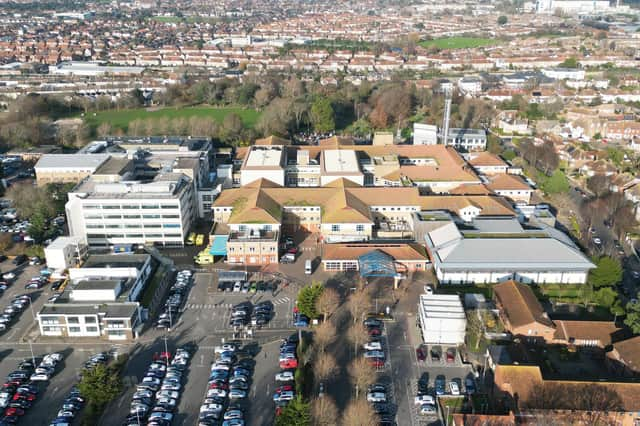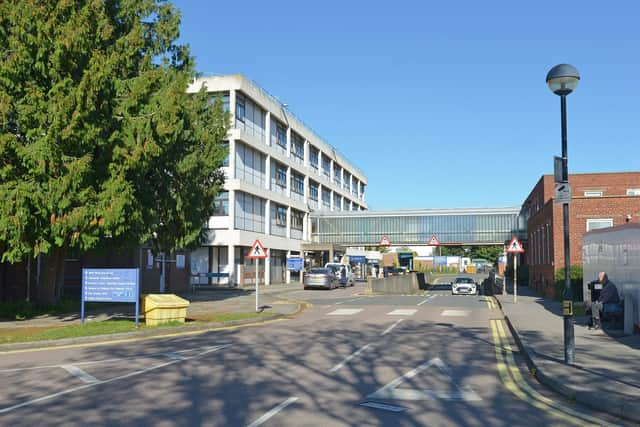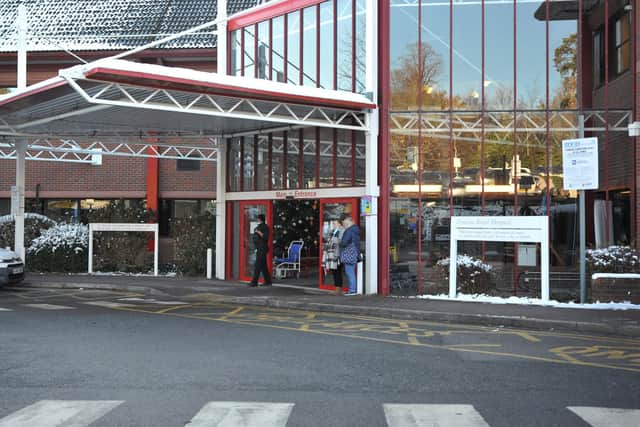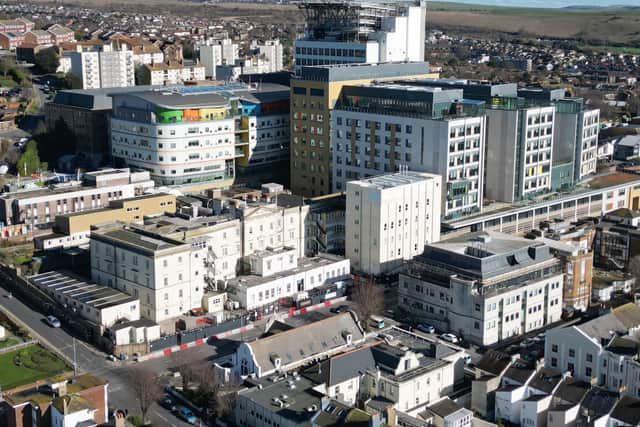West Sussex hospitals downgraded from 'outstanding' to 'requires improvement'


The CQC has published four reports on two services provided by University Hospitals Sussex NHS Foundation Trust (UHSussex) following inspections in August.
Unannounced inspectors looked at surgical services at Worthing Hospital, St Richard’s in Chichester, the Princess Royal in Haywards Heath and the Royal Sussex County in Brighton, ‘to check on the programme of improvement work carried out by the trust in response to concerns CQC raised at previous inspections’. This included action CQC took in August, 2022, to suspend upper gastrointestinal surgery at the trust, the CQC said. Inspectors also looked at medical care, including older people’s care at Worthing and the Royal Sussex County. Following the inspections:-
Advertisement
Hide AdAdvertisement
Hide AdWorthing Hospital’s overall rating has dropped from ‘outstanding’ to ‘requires improvement’, as did the rating for medical care, including older people’s care. Surgical services have dropped from ‘good’ overall to requires improvement.


St Richard's Hospital has dropped overall from ‘outstanding’ to ‘requires improvement’. Surgery has dropped from ‘good’ to ‘requires improvement’.
Princess Royal Hospital was re-rated as ‘requires improvement’ overall. Surgery has dropped from ‘good’ to ‘requires improvement’.
Royal Sussex County Hospital has risen overall from ‘inadequate’ to ‘requires improvement’, as has surgery. Medical care, including older people’s care, has dropped from ‘good’ to ‘requires improvement’.
Advertisement
Hide AdAdvertisement
Hide AdOverall, the rating for the trust has not changed and it remains rated as ‘requires improvement’.


Neil Cox, CQC deputy director of operations in the south said: “Following our previous inspection of University Hospitals Sussex NHS Foundation Trust, we told them where they needed to make improvements especially around leadership and culture. At this inspection whilst we found improvements in some areas, other issues remained. Leaders must address these issues at a much more urgent pace.
“We found a wide disconnect in the relationship between staff and senior leaders and how they were working together. These issues were clearly having a knock-on effect on the quality of care being delivered to people using services.
“We saw some improvements in the culture issues we found in theatres at previous inspections. However, there were still reports of bullying and low staff morale as a result of not feeling listened to, although the trust was taking steps to support staff in speaking up. Staff have important feedback about services that can drive improvement in people’s care, so leaders must find more ways to hear what staff are saying and act on it.”
Advertisement
Hide AdAdvertisement
Hide AdMr Cox added that, despite these issues, the CQC saw some ‘exceptionally caring staff going above and beyond’.


“We saw staff taking home one person’s clothes and washing them as they had no family, ensuring someone’s favourite biscuits were available despite it not being a standard item, and bringing in nail polish so someone’s relative could paint their nails for them,” he added.
"Staff were consistently asking people about their personal, cultural and religious needs and understood how to incorporate this into their care.
“We will continue to monitor the trust closely and will return to carry out another inspection to ensure improvements are sustained and embedded. If this doesn’t happen, we won’t hesitate to take further action in line with our enforcement powers.”
Advertisement
Hide AdAdvertisement
Hide AdThe CQC said across surgery at more than one service inspectors found: there weren’t always enough staff to care for people and keep them safe; staff didn’t always manage medicines well; the service did not effectively plan care to meet the needs of local people, with demand outstripping capacity apart from at Royal Sussex County Hospital; people could not always access services when they needed it and had to wait too long for treatment, with often repeated cancellations and the environments did not always support safe care and treatment. However: inspectors found very caring and compassionate staff across all sites; at Princess Royal Hospital people with a dementia diagnosis had equal access to surgical services and were supported by the dementia liaison team where required; at Royal Sussex County Hospital the service planned care to meet the needs of local people, took account of peoples’ individual needs, and made it easy for people to give feedback; at St Richards Hospital the team had developed a wide range of day case surgeries so people could be discharged from recovery early and at Worthing Hospital the team had identified an increase in people falling resulting in harm – to manage this risk, the service located a member of staff in each bay to provide enhanced monitoring and observation.
In medical care, including older people's care, at Worthing Hospital inspectors found: staff did not always assess risks to people, or act on them, or keep good care records – documentation of records were stored in multiple formats; people sometimes had to wait long periods of time for their call bell to be answered and the environment did not always meet national guidance; staff did not always carry out daily safety checks of specialist equipment, such as resuscitation trolleys, and outcomes for people were not always positive, consistent and did not meet expectations, such as national standards – specialist support from speech and language therapists were not always available for people who needed it. However: the service planned and provided care in a way that met the needs of local people and the communities served; it also worked with others in the wider system and local organisations to plan care; the service ensured people’s behaviour was not controlled by excessive or inappropriate use of medicines and people were treated with compassion and kindness.
In medical care, including older people's care, at Royal Sussex County Hospital inspectors found: patient records were not easily accessible for all staff and were not audited; not all staff received training to effectively support people with learning disabilities, autism or mental health needs; not all staff were competent for their role in relation to caring for people with specific mental health concerns or under section; outcomes for people were not always positive, they did not always meet expectations consistently in accordance with national standards and the service did not have a vision or strategy. However: staff worked well together for the benefit of people, advised them on how to lead healthier lives, supported them to make decisions about their care, and had access to good information; staff treated people with compassion and kindness, respected their privacy and dignity, took account of their individual needs, and helped them understand their conditions and the service engaged well with people and the community to plan and manage services and all staff were committed to improving services continually.
Advertisement
Hide AdAdvertisement
Hide AdA spokesperson for UHSussex said: “The CQC inspection team found frontline teams giving good patient care, treating patients with kindness and respect, and working well together. Those are fundamental strengths, and it is to their enormous credit that they are giving such good care in such difficult circumstances.
“But the CQC also found too many things that we need to do better – from more consistent record-keeping, to training, and concerns about culture, staffing levels and the pressures on colleagues. We accept those challenges and we have plans in place to put them right.”